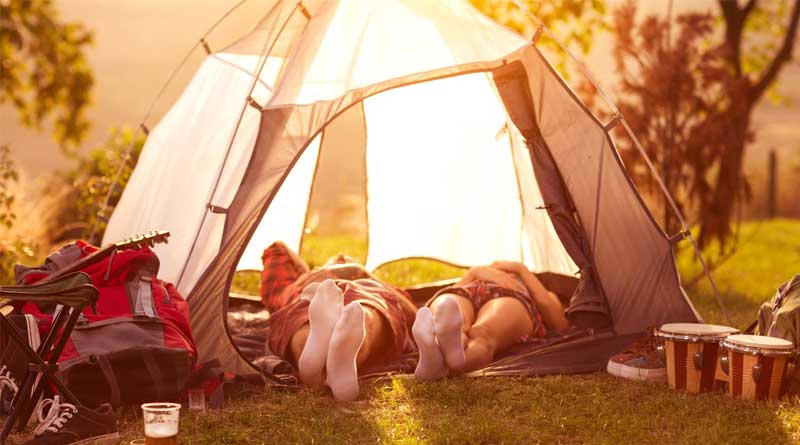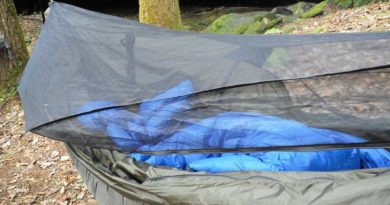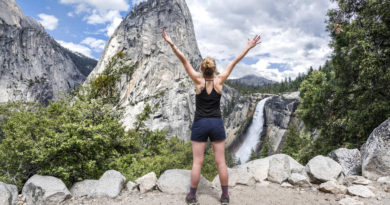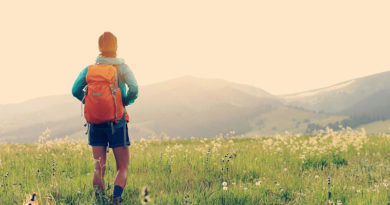The 10 Most Comfortable Ways to Sleep in a Tent
Camping is a great way to get away from the dull, stressed life that we face daily. There is nothing better than sleeping under a clear sky, full of stars, calm, peaceful, and quiet. It helps the body to relax and it is the best way to reset your sleep cycles.
But while sleeping in the outdoors may be beneficial for health, most people don’t find comfort while sleeping in a tent. It leaves them wondering if they are doing something wrong at this point. So what are the most comfortable ways to sleep in a tent?
Choosing the right gear
Most of the time, problems arise during a hiking or camping trip simply because we are underprepared. This makes the trip very uncomfortable and more tiring than it should be. Choosing the right gear matters a lot if you are looking forward to having a wonderful camping trip.
1. Sleeping bag
The sleeping bag is the most important gear to assure you a comfortable sleep. It doesn’t have to be the most expensive on the market. But you would have to consider several factors e.g. the size of the bag, insulation, shape, durability, the weather, conditions, etc.
Usually, square-shaped sleeping bags are used for the summer weather as they are spacious, broad allowing more air to flow through them. The winter weather requires a mummy shaped sleeping bag for more insulation. However, there are plenty of options in the market that will allow multi-season use for a fair price.
For a simple camping trip in the dry, summer season, a basic sleeping bag like the Kelty Cosmic, will be enough. But if you are looking to camp in the snowy mountains with extremely low temperatures, then you would have to go for more robust sleeping bags like the Western Mountaineering UltraLite and similar class.
However, sleeping bags like the Western Mountaineering MegaLite or Marmot Hydrogen are appropriate for most camping trips people go on.
2. Sleeping pads
When you sleep on the ground, it is very uncomfortable, especially if the tent is set up on a rocky surface. Sleeping pads add a layer of comfort to make your sleep comfortable. There are three types of sleeping pads to choose from self-inflating, air, and closed cell foam.
All these pads have their ups and downs. You would have to choose the right one according to the circumstances you are going to camp in. Closed-cell foam pads like the Therm-a-Rest Z Lite are usually used where lightweight backpacking matters. They are not as comfortable as the air pads, hence, making air pads the most popular choice. So, there are plenty of options to choose from in the market when it comes to air pads.
Side sleepers face an additional problem while choosing a sleeping pad. However, there are good options available for side sleepers on the market. Sleeping pads like Big Agnes Q Core SLX and Therm-a-Rest NeoAir XTherm are good options for side sleepers.
3. Sleeping pillows
Sleeping on the ground without a pillow can cause a lot of strain on the neck which can severely compromise the comfort of your sleep. There are a lot of ultralightweight sleeping pillows available on the market that can provide you with comfort for the cost of a few added ounces.
There are three types of pillows to choose from. The inflatable pillows like the OutSmart Inflatable Camping Pillow is the lightest to carry. Then there are compressible pillows like the Therm-a-Rest Compressible Travel Pillow have foam or other soft material in it and this type is the most comfortable. However, they are bulky and weigh a bit more. Then, there are the hybrid pillows like the Simba Hybrid Pillow that are the best of both worlds.
Choosing a sleeping pillow depends on your personal preference and what makes you feel more comfortable. It also depends on how much weight you are willing to put up with. But for the cost of a few ounces, you can have a good night’s sleep and wake up fresh the next day to enjoy your outdoor experience to the fullest.
4. Earplugs
Many people are sensitive to sounds while they sleep. People like these need pin-drop silence to sleep comfortably. Well, the bad news is, nature is not so quiet, even at night. There are sounds being made by wildlife all the time.
In order to sleep then, sensitive sleepers should have earplugs with them. Earplugs prevent you from these constant sounds around you that can get freaky preventing many people from sleeping. In situations like these, earplugs can be a sleep saver! Just make sure the earplugs you have chosen have a comfortable fit and do not cause your ear lobes to hurt.
5. Bug repellent
The outdoors can be………buggy! There are a lot of blood-sucking pests that you have to deal with. Mosquitoes are in abundance and therefore, malaria is in the air, literally! But that is not all, there are other disease-carrying bugs out for your blood.
If you forget to bring your bug repellent, good luck having a comfortable sleep. Do not forget to bring a bug repellent. There are several good bug repellents. Some perfumes like Victoria’s Secret Bombshell and Avon’s Skin So Soft bath oil have been reported to work well as bug repellents. That frees you from the annoying smell of a conventional bug repellent, should you choose to use these perfumes.
Should you forget a bug repellent, essential oils like lemon eucalyptus can be used to keep the bugs away. NosiLife also offers bug repellent clothing which is a good option and has proven to be bug repellent.
Doing the right things
After you have chosen the right gear to ensure a comfortable sleep in a tent, there are some things you need to do that will actually help you sleep well. People make so many small mistakes at once that pile up in the end to ruin their sleep. Knowing what to avoid and what to do to ensure a comfortable sleep is essential.
6. Take your time to pitch the tent
The ground you pitch your tent on should be as strategic as possible. It is no less than choosing a battleground in a war because you are up against the odds and you want to take as much advantage of the ground as possible. Therefore, take your time in choosing the right, suitable spot.
A rocky, uneven or tilted surface needs to be avoided while pitching the tent. You need to find a flat piece of earth with some grass on it preferably. Pitch the tent at a distance if you have noisy neighbors. If you are camping in the campground, then stay close to the proximity of a washroom.
Pitch the tent in a sheltered area so that it doesn’t overheat if you are camping in summer and avoid the trees in winter as snow from the trees can cause a lot of trouble if it falls down. Pitch the tent in a place that is clear of snakes, bears, and other harmful animals.
7. Control the temperature
Controlling the temperature of your tent is important as the temperature can cause problems during sleep. In hot, humid weather you might find yourself with no breeze. It can be suffocating. You might have to carry a portable air conditioner to deal with this problem.
Dealing with such hot weather is occasional. Usually, the weather in the outdoors is cold during the night even in summers. So it is essential to stay warm during the night. There are several ways to do that. The easiest way is to use a portable heater. But it is recommended to know how to warm your tent without a heater.
A campfire is the best way to keep the tent warm. Having a warm cup of tea at night will protect you from the cold and it will make you feel good and is also proven to help you sleep better. Make sure that you don’t breathe in your sleeping bag while sleeping as the condensation will make it cold.
8. Stop drinking and eating
According to studies, you should stop having heavy meals at least 3 hours before sleeping, otherwise, your stomach will start hurting due to indigestion. We in our lives face this situation when we eat too much before going to bed. Then we wake up in the middle of the night feeling as if there is a big rock in our stomach. So avoid having heavy meals before sleeping.
However, having a light meal can help you in the night as the process of digestion produces heat inside the body. It will keep you warm during the night resulting in a night of better sleep. Avoid alcohol after dark strictly. So many campers bring with them beers and other favorite alcoholic beverages. Although alcohol makes you drowsy initially, it interferes with your sleep in the latter half of the night. Alcohol also dilates blood vessels allowing heat loss.
You should also stop drinking water at least 4 hours before going to bed. Waking up in the middle of the night to pee interrupts sleep quality. So make sure you stop drinking water at least 4 hours before going to bed. But still, keep your shoes prepared just in case you need to wake up in the middle of the night to pee.
It has also been found in studies that caffeine has disruptive effects on your sleep even 6 hours after consumption. It is recommended that you stop consuming caffeinated drinks at least 8 hours before going to bed.
9. Choose the right clothes
Make sure that the clothes you are wearing to sleep are as dry as possible. If it’s really cold, you might consider wearing socks and gloves. If the weather is hot, then you can change into light clothes that are breathable. Avoid overdressing. Wearing too many clothes like a jacket and stuff inhibit the heat-insulating capability of your sleeping bag. Besides, it’s an overkill.
It is recommended that your night clothes be different and you should avoid sleeping in clothes that are worn during the day. The clothes worn during the day are exposed to the outdoors. You will gather dirt, pollens, and sweat in your clothes. Sleeping in those clothes is not a good idea as it can cause irritation on your skin or allergies if you have them. So keep a set of sleep only clothes with you.
10. Stay calm
Sleeping in a new place is unsettling, especially to some people. It takes them quite a while to adjust to the new place and they keep waking up at every little sound. So it is normal if you would have trouble sleeping in your tent. Plus, as discussed earlier, the sounds do get a lot freaky in the darkness of the night causing fear and anxiety.
In such a case, stay calm through deep breathing and meditation. If you are sleeping alone in your tent, then bring a book to distract yourself along with a lantern. After one or two days, your circadian cycle will synchronize with the day and night cycle and you will start feeling sleepy as
soon as the sun goes down.
If everything else fails, then just stare away at the clear sky and hope that you will fall asleep while looking at a sky full of stars!




